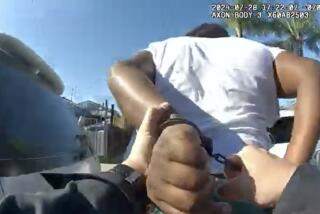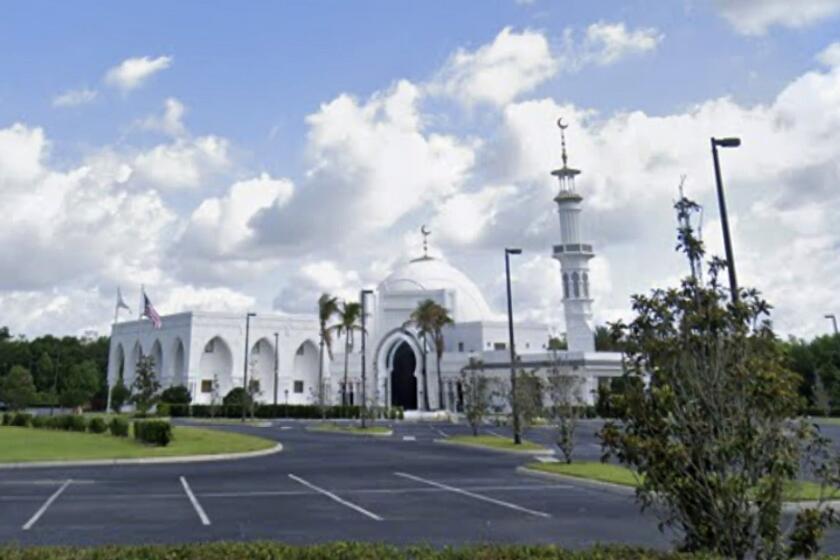The ‘Bloody Christmas’ of 1951
Long regarded as a leading laboratory of urban policing techniques, the Los Angeles Police Department also has been a school for scandal.
And in an era in which the department is still grappling with how best to implement the reforms proposed by the Christopher Commission, it is helpful to recall the persistence and solubility of past problems.
Four decades before the furor over the videotaped beating of Rodney G. King, the LAPD was rocked by a brutality scandal that shocked the city to its foundations. A version of that incident is recounted in the film “L.A. Confidential,” a compelling noir thriller based on the James Ellroy novel.
The incident involved the unprovoked beating of seven prisoners on what came to be called “Bloody Christmas” in 1951. Its aftermath produced not only the first grand jury indictments of serving LAPD officers, but also the first criminal convictions for use of excessive force in the department’s history.
*
Up to that point, Los Angeles’ media had always loved the LAPD unconditionally. Police officers and journalists attended one another’s picnics and went to the same movies on the same free passes. Thus, The Times’ initial report on the scandal appeared under a headline reading: “Officers Beaten in Bar Brawl; Seven Men Jailed.”
Police Chief William Parker initially denied charges of police brutality and went on television to accuse his department’s critics of trying to discredit law enforcement. But he also launched two intensive investigations, which ultimately involved interviews with 405 witnesses and produced a report that ran for 204 single-spaced typewritten pages.
After reading it, Parker transferred 54 officers--including two deputy chiefs--and suspended 39 others.
“Bloody Christmas” began with a little too much Christmas cheer, both in the Central police station on 1st Street where about 100 officers were enjoying a party, and at Max Kohn’s bar on Riverside Drive, where a party of seven men had gathered for a few beers. Two police officers walked in and tried to eject a pair of overly enthusiastic holiday celebrants. A fight erupted outside in the parking lot and the two outnumbered officers were beaten up. One received a black eye and the other a cut on his forehead that required stitches. The brawl broke up when a nearby resident threatened the group with a rifle.
A few hours later, all seven of the merrymakers were arrested at their homes. All but one, Daniel Rodela, were taken to the Central station shortly after 2 a.m. Christmas morning, where they were booked and left in the waiting room.
Rodela, a 23-year-old, 114-pound meter reader for the Gas Co. “resisted arrest,” so the officers beat him mercilessly in front of his family, then handcuffed and dragged him by his hair into the police car. From his home, they drove to Elysian Park, where they savagely beat him with a “flexible instrument,” fracturing facial bones and throwing his nose out of place.
*
Rodela later testified that--while feigning unconsciousness--he heard one officer say to another, “You’d better make your report good . . . that he resisted arrest and assaulted you with a flower pot or something.”
The injured man spent more than a week in two hospitals, receiving two blood transfusions. It took him a month to recuperate before he could return to work.
When word of the parking lot fight reached the officers celebrating in the Central station, the story had been embellished to include the allegation that one of the injured officers was going to lose his eye. Immediately, the enraged officers put down their drinks, went to where the six suspects were being held, and forced them to line up. After 95 minutes of blows, punches and kicks, the wooden floor and walls were covered in blood.
Before they were moved to the Lincoln Heights Jail--and beaten again--one of the victims later testified that he heard an officer saying, “What’s happening to these boys is life insurance for the rest of us. When I get through with these guys they’ll never jump a policeman again.”
During their trial, six of the seven victims were referred to as “mad dogs” and “hoodlums” by the prosecuting attorney. But it was Municipal Judge Joseph Call who said: “This case is permeated with testimony of vicious beatings and brutality perpetrated without cause . . . and it stinks to high heaven and all the perfumery in Arabia cannot obliterate its stench.”
Prior to Call releasing the victims and denouncing “lawless law enforcement,” Parker appointed a special board of inquiry consisting of five police inspectors to review reports investigated by the Department of Internal Affairs. “Police brutality” became almost a standing headline and the grand jury launched its own investigation.
After a three-day hearing, the grand jury indicted eight officers. A year later, after separate trials, one officer was cleared; two were acquitted and five were convicted of assault under the color of authority.
More to Read
Sign up for Essential California
The most important California stories and recommendations in your inbox every morning.
You may occasionally receive promotional content from the Los Angeles Times.










